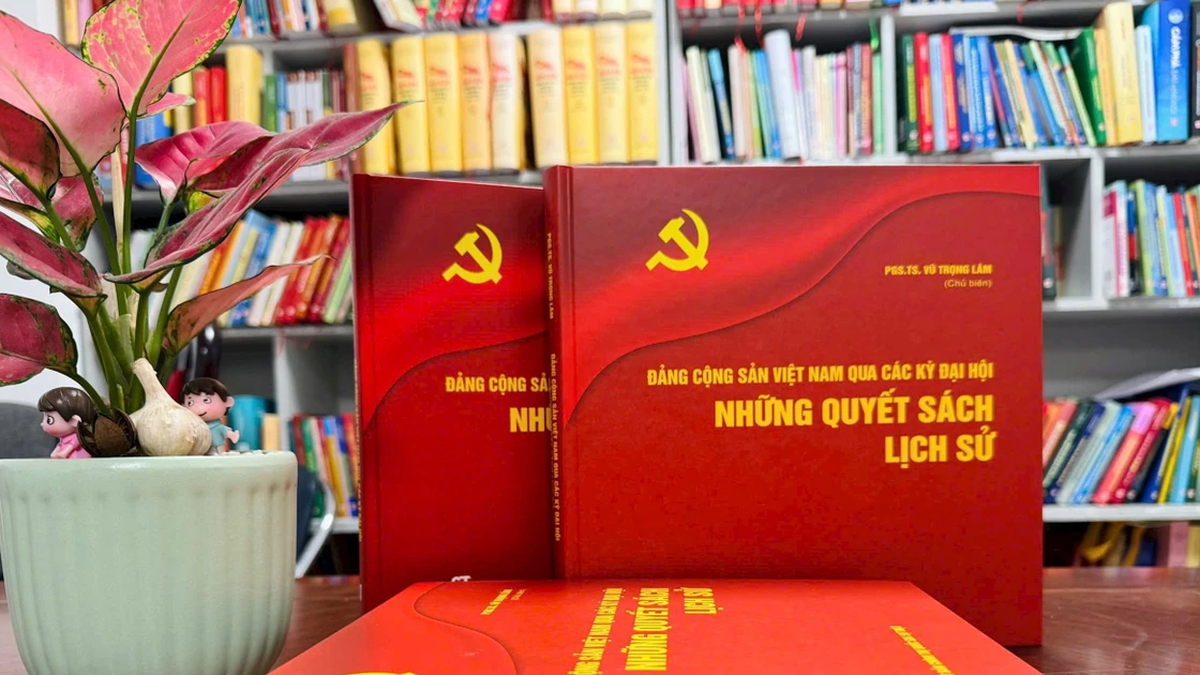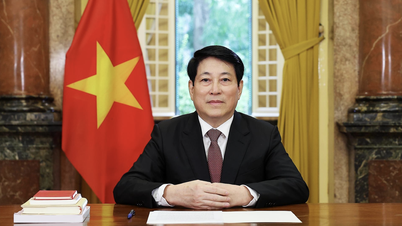(Book introduction by comrade Ngo Dong Hai, member of the Party Central Committee, Secretary of the Provincial Party Committee)
Comrade Ngo Dong Hai, member of the Party Central Committee, Secretary of the Provincial Party Committee, spoke at the work introduction ceremony.
Good roots are in our hearts.
One heart is worth three talents
As a Vietnamese, surely everyone has at some point recited a verse of Kieu or encountered their own life and fate in the Tale of Kieu, the book of “thousands of moods” that the great poet Nguyen Du wrote more than two hundred years ago. However, reading the Tale of Kieu and Nguyen Du’s monumental works without having the opportunity to research his life and career, it is difficult to fully understand him, difficult to see all the goodness and beauty of the literary works that he left behind for life.
The great poet Nguyen Du is praised by posterity as having “eyes that see through all six realms, a heart that thinks through thousands of generations”, knowing how to sympathize with each person and all their pain, knowing how to feel the social life of the era along with the human conditions, the historical ups and downs of that era. The immense humanity crystallized in his poems is the “pain of humanity” that remains despite experiencing countless “tragedies and vicissitudes”. However, the deep sympathy for “all living beings” perhaps did not arise from the glorious days in Bich Cau, when he was still a gallant young master of the ancient Thang Long land, sailing on Long Cau Lake every day? Perhaps the inspiration for his immortal works only began when he “gave up his life of luxury, is it crazy”, the vastness of his journey of thousands of miles in foreign lands “Jiang Nam, Jiang Bac, empty pockets”? The painful "Thương văn sự" for the national hero Nguyen Trai in the Le Chi Vien tragedy was not simply from the sympathy of two great cultural figures, but came from the years Nguyen Du lived in the land of Thai Binh , the homeland of the talented girl Nguyen Thi Lo, originally from Hai Trieu village (Hoi village) Ngu Thien district, Long Hung road (now Hung Ha district, Thai Binh province)? And the soul of the six-eight verses imbued with folk essence that reached the level of excellence in the Tale of Kieu and other works was perhaps the blend of the Quan họ folk songs of Bac Ninh, his mother's hometown, the wonderful Vi dam, his father's hometown, and the ancient cheo tune of Thai Binh, the homeland of the "tea garden girl", the hard-working wife Doan Thi, with whom he had been friends and shared during the ten years of hiding and hiding "ten years of wandering"? Ten years of poverty and pain, family ruin, wife and children passed away, but still had Phong Nguyet Sao, Chieng Hoi, Hai An village as a place to take refuge.
Ten years filled with love for people and land in Son Nam Ha town, in Thai Binh land, the place of shelter, where there is Bach Lang river, where there is Phu Nong river flowing through Quynh Hai village (Luoc river, the section flowing through Quynh Coi) to the sea, every night the gentle moonlight still visits to comfort:
The moon fills the sky all night long
The boat is still the same, the boat is still the same
Whose home is happy when spring comes?
The night garden of Quynh Chau is thousands of miles away.
(Quynh Hai Nguyen tieu)
Perhaps, it is the human love, the love of life, full of emptiness in Son Nam Ha town, Thai Binh, that has become the source of nourishment for Nguyen Du's poetry to become closer and closer to the hearts of the working people, the laughter "tieu hao ho yen da thao trung" of the old ferryman "Thanh Thao village in front of Ngoa old man" (Thon da), the voices of mulberry growers, mat weavers...?
Writer Vo Ba Cuong has been searching for answers to those questions. He has returned to Tien Dien, to Lam River, and has seen the Hong Linh land vaguely showing a part of Nguyen Du's life in it. But it was in Thai Binh that Vo Ba Cuong truly found the image of Nguyen Du along with the years when the Great Poet incarnated, hiding in this land of "easy to go, hard to return, near to far". The image and those years of the Great Poet were carved by Vo Ba Cuong in the work "Who is still crying for To Nhu", not through a monograph or research topic - which has been mentioned in many previous works - but through the genre of historical novels, with the endless openness of imagination and gratitude, aiming to restore the image of a genius "who dies but remains as an elite".
Many people have written about Nguyen Du and the Tale of Kieu, but perhaps no one has dared to recreate a period of To Nhu's miserable life that was rich in poetic material; even more so, no one has written to recreate the life of the Great Poet during his years living in Thai Binh in the style of unofficial history. The unofficial history recreated with the land and people that have been full of love for life for many years, will at some point become "the echo of Kieu", become official history in people's hearts, official history in that very space.
“Who is still crying for To Nhu” is the heart and soul of a writer, a son of Thai Binh, dedicated to his homeland. The author also offers to the literary and artistic world not only a literary work with unique features in both content and form, but also a colorful piece, making the proud artistic picture of one of the greatest poets of the Vietnamese people brighter.
Source




































































































Comment (0)